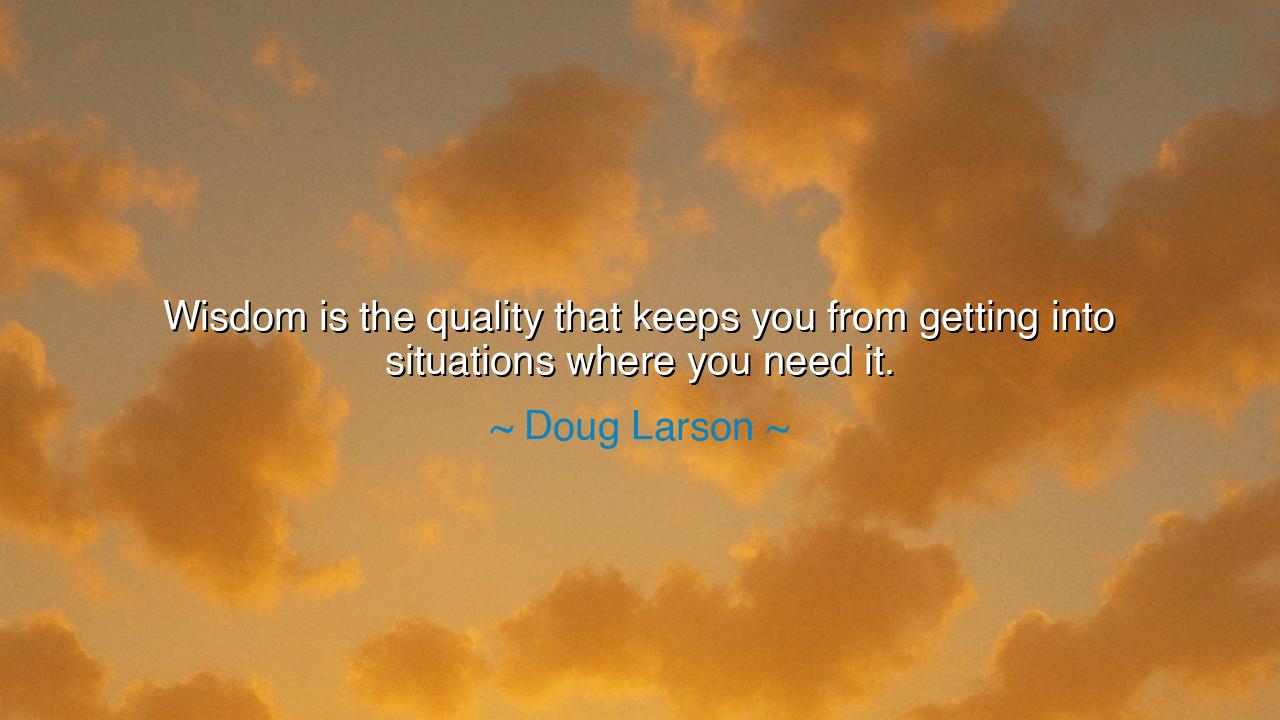
Wisdom is the quality that keeps you from getting into






Wisdom, in its truest form, is not merely the ability to solve problems or escape danger once it has arisen. It is the ancient light that guides one to avoid the snares before they are ever encountered. Doug Larson’s words, “Wisdom is the quality that keeps you from getting into situations where you need it,” speak to this profound truth. The wise do not only triumph in the storm—they read the winds and currents long before, steering their vessel to calmer waters. To possess wisdom is to walk a path where calamity is less likely to arise, for one has seen the patterns of fate and chosen well.
The origin of this thought lies in humanity’s oldest teachings. In the temples of Greece, philosophers like Socrates and Aristotle spoke of prudence, a virtue that allows one to discern which roads to travel and which to avoid. In the East, sages like Lao Tzu taught that the way of the Tao is to flow gently, avoiding resistance rather than clashing with it. Larson, a modern humorist, cloaked this timeless idea in wit, yet beneath his humor lies a truth as old as civilization: the greatest battles are those never fought, because foresight rendered them unnecessary.
Consider the fate of Napoleon Bonaparte in the bitter winter of Russia. A man of immense tactical genius, he relied on his brilliance to win battles once conflict had begun. Yet, wisdom would have told him not to launch the campaign at all. His lack of foresight led to a disastrous retreat where even genius could not save his army. In contrast, leaders like George Washington displayed wisdom when he refused to overextend his forces, often choosing retreat and patience over glorious battles. By avoiding perilous situations, Washington preserved his army and ultimately won independence for his people.
In our daily lives, this teaching echoes quietly. The youth may rush forward, confident in their ability to fix mistakes, while the elders, seasoned by time, move carefully so that mistakes need not be made. The wise do not seek to impress through daring acts of rescue; rather, they seek harmony and balance, ensuring that no rescue becomes necessary. It is far more glorious to prevent ruin than to rise heroically from it.
Thus, let the generations remember: wisdom is not reactive but proactive, not a sword drawn in battle but the shield that prevents the blow. Like the farmer who plants in the right season, or the traveler who checks the stars before his journey, the wise act early and with discernment. Larson’s words remind us that the greatest display of wisdom is a life lived with few regrets, guided by choices that make crises rare rather than frequent.
In this way, we come to understand that wisdom is both guardian and guide. It spares us from trials that would otherwise test us and ensures that when difficulties do arise, they are few and light. Let us not seek wisdom only when surrounded by chaos, but cultivate it daily, so that the road ahead remains clear, and our journey unfolds with grace and purpose.






AAdministratorAdministrator
Welcome, honored guests. Please leave a comment, we will respond soon